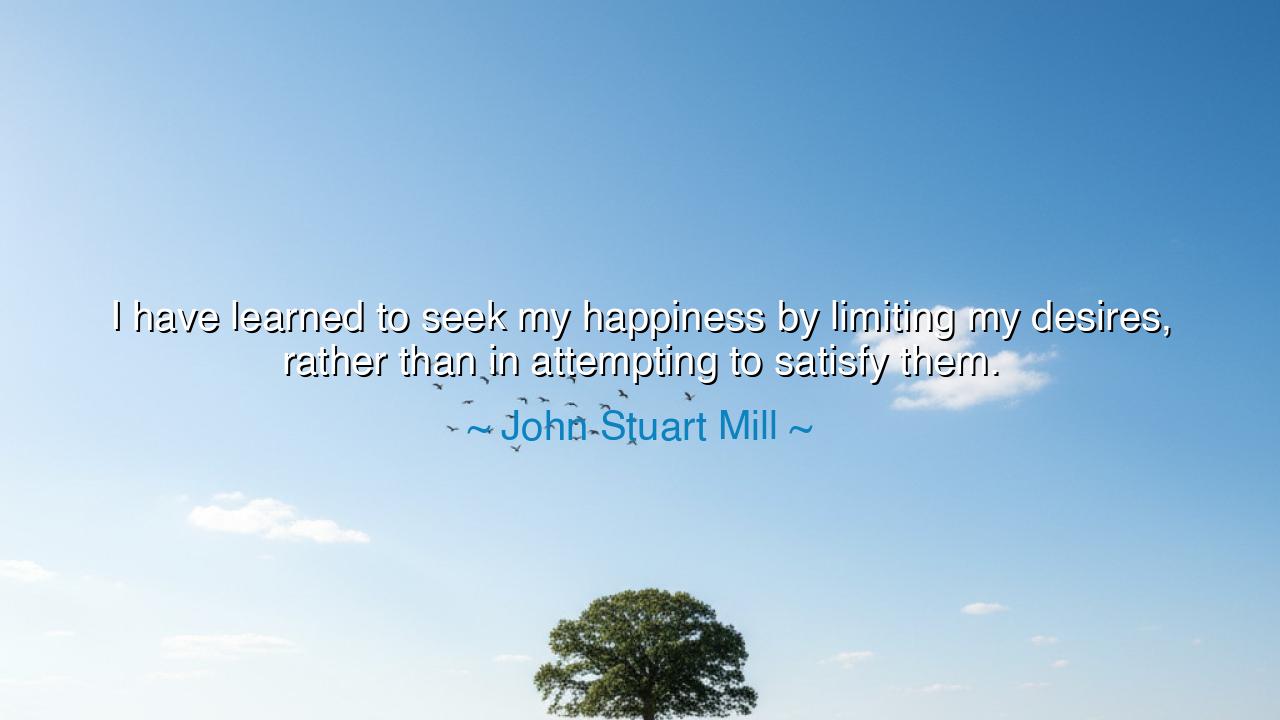
I have learned to seek my happiness by limiting my desires
I have learned to seek my happiness by limiting my desires, rather than in attempting to satisfy them.






The philosopher John Stuart Mill, whose mind shone like a lantern in the age of reason, once spoke with the calm authority of one who has wrestled with the storms of the soul: “I have learned to seek my happiness by limiting my desires, rather than in attempting to satisfy them.” These words, simple yet profound, reveal not the doctrine of denial, but the wisdom of balance. Mill, who walked the path of intellect and introspection, understood that the secret to peace is not in endless pursuit, but in the quiet mastery of one’s own wants. For to conquer the world is vanity—but to conquer the self is victory eternal.
The origin of these words springs from both philosophy and pain. Mill, a child of genius and discipline, was trained from his earliest years to think, to analyze, to achieve. Yet in the height of his youth, he fell into despair—a shadow that even reason could not dispel. He had learned all that the mind could know, but not what the heart could bear. In that darkness, he discovered the hollowness of desire, the endless hunger that consumes but never fills. Thus he turned inward and learned the sacred lesson of restraint: that true happiness is not found in possessing everything, but in needing little.
This teaching echoes through the ages. The Stoics of ancient Greece, those calm sages who stood unshaken amidst the tumults of fortune, taught the same law of the spirit. Epictetus, once a slave, said that no man is free who is enslaved by his own cravings. Seneca, surrounded by the splendors of Rome, warned that wealth and luxury multiply desires faster than they can be satisfied. The wise of all ages have known this: to chase desire is to drink salt water—it promises to quench, but only deepens the thirst. Mill, in his modern voice, rekindled this ancient truth, declaring that peace of soul lies not in expansion, but in limitation.
Consider the life of Buddha, who, centuries before Mill, sought truth amid the palaces of pleasure. Born into abundance, he had every desire met—yet he found no rest in them. When he beheld the suffering of the world—age, sickness, and death—he renounced his wealth and set forth on a journey of the spirit. In the stillness of meditation, he discovered what kings could not buy: happiness through detachment, freedom through simplicity. His enlightenment was not the rejection of life, but the awakening to its essence—that peace arises when one ceases to crave. Thus, from East to West, the same river of wisdom flows: limit desire, and you will find that joy needs little to live.
But beware—this teaching is not a call to apathy, nor an invitation to withdraw from life. It is not the cold renunciation of the ascetic, but the noble restraint of the wise. Mill did not say that desire is evil, only that it must be governed, lest it become a tyrant. To live without desire is death; but to live ruled by desire is slavery. The art of happiness is to walk the golden mean—to love, to strive, to create, yet without losing the serenity of the heart. For the man who owns himself fears no loss; he may enjoy the world without being possessed by it.
In this age of abundance, Mill’s words burn with renewed light. We live surrounded by temptations—wealth, fame, indulgence, the ceaseless pursuit of “more.” Yet the more we gain, the less content we become. The modern soul, like the ancient, must learn again the art of simplicity. True happiness is found not in the noise of abundance, but in the quiet of enough. To rise each morning grateful for what one has, rather than lamenting what one lacks—this is the mark of wisdom. To desire only what is within one’s reach, and to cherish what cannot be taken—this is freedom.
So, my child, take these words as your compass: limit your desires, and your joy will become limitless. Seek not to own the stars; learn instead to marvel at their light. When you feel the ache of wanting, pause and ask—does this desire serve my peace, or steal it? Choose always the path of moderation, and life will unfold with grace. For happiness, as Mill and the ancients have taught, is not a prize won through conquest, but a garden tended through restraint. And in the stillness of that garden, where the heart desires little and loves much, you will find the only treasure that endures—contentment.
Thus remember: the one who masters his desires masters his fate. The one who seeks happiness not in what he gains, but in what he releases, becomes invincible. For all the world may change, but a peaceful heart is kingdom enough.






AAdministratorAdministrator
Welcome, honored guests. Please leave a comment, we will respond soon